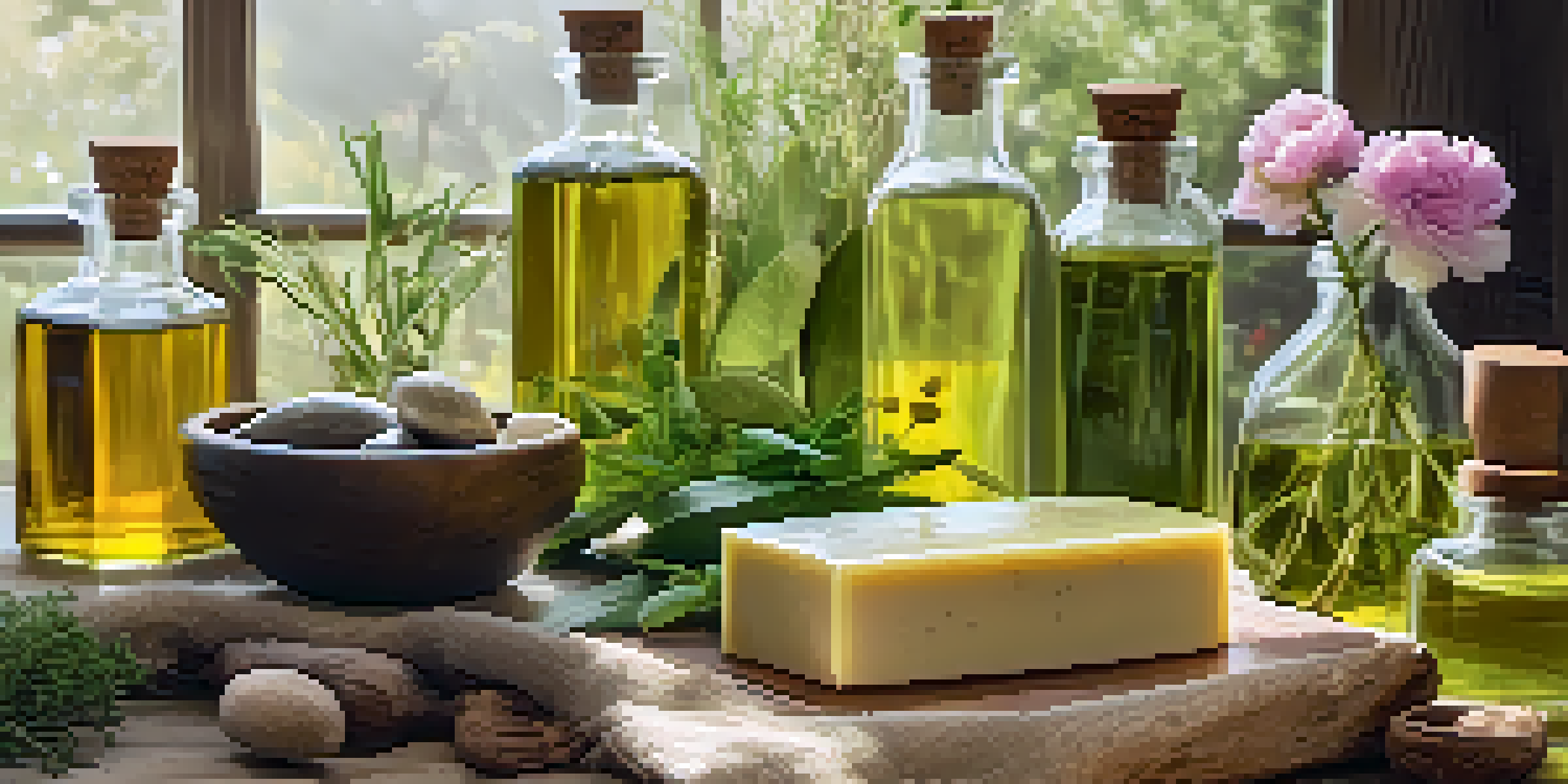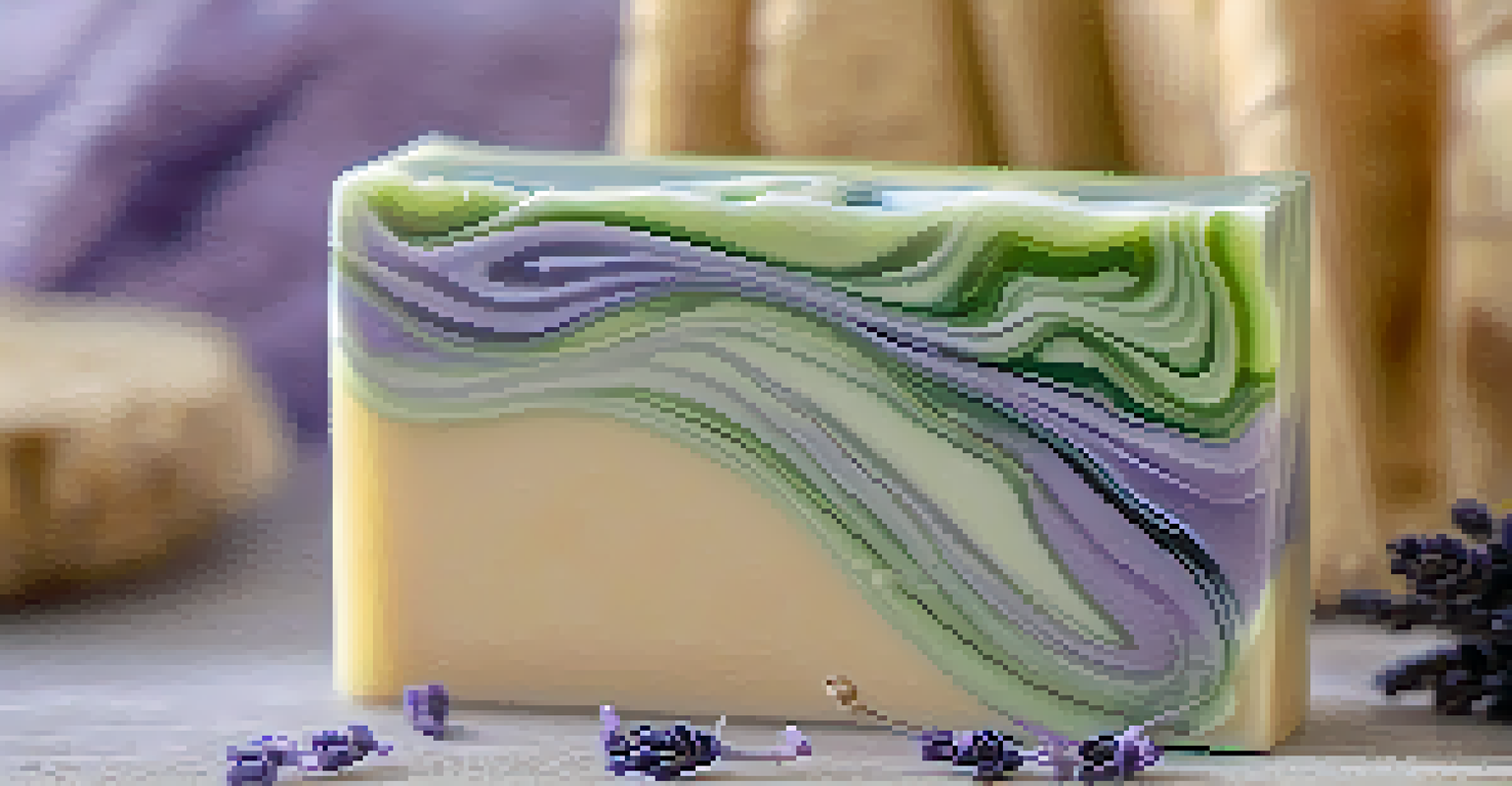How to Choose the Right Oils for Your Soap Recipes

Understanding Soap Making Oils and Their Benefits
When diving into soap making, one of the most crucial decisions is selecting the right oils. Each oil has unique properties that contribute to the soap's texture, lather, and moisturizing abilities. For instance, olive oil is renowned for its nourishing qualities, making it a popular choice among soap makers.
Soap making is an art and a science, where creativity meets chemistry.
Additionally, oils like coconut oil add a rich lather and hardness to the soap bar, while palm oil helps stabilize the overall structure. Understanding these characteristics can help you tailor your soap recipes to achieve the desired qualities and benefits.
Using a combination of oils can create a well-rounded soap that cleanses, moisturizes, and feels luxurious on the skin. Remember, the right blend can make all the difference in your final product.
Choosing Oils Based on Desired Soap Properties
Before picking your oils, consider the properties you want in your soap. If you're aiming for a hard bar, oils like coconut and palm are excellent choices. On the other hand, if you want a moisturizing soap, opting for oils like avocado or sweet almond can deliver that extra hydration.

It's also essential to think about lather! If a bubbly lather is your goal, coconut oil should be at the forefront of your selection. Balancing these properties can help you create a soap that meets your personal needs and preferences.
Choose Oils for Desired Properties
Selecting oils based on their unique properties can help you create soap that meets your specific needs, whether that's for moisturizing, lather, or hardness.
Remember, experimenting with different oil combinations can yield surprising results. Don't hesitate to try new mixtures to discover what works best for you.
Common Oils and Their Soap Making Properties
There are several popular oils used in soap making, each offering distinct advantages. For example, olive oil, with its high oleic acid content, promotes a gentle and moisturizing soap. Meanwhile, castor oil not only adds richness but also enhances lather, making it a fantastic addition to any recipe.
The best part about soap making is that you can experiment endlessly until you find your perfect blend.
Coconut oil, known for its ability to produce a bubbly lather, can sometimes be drying on its own. Therefore, it’s often blended with softer oils to balance its effects. By understanding the properties of these oils, you can make informed decisions for your soap recipes.
Exploring various oils can also lead to exciting discoveries. Trying lesser-known oils like hemp seed or jojoba can introduce unique qualities to your soaps.
Understanding Essential vs. Fragrance Oils in Soap
In addition to carrier oils, you'll want to consider the scents in your soap. Essential oils are derived from plants and offer natural fragrances along with therapeutic properties. For example, lavender essential oil not only smells delightful but is also known for its calming effects.
On the other hand, fragrance oils are synthetic and can provide a wider variety of scents. While they can be tempting due to their vast selection, it's essential to ensure they're soap-safe to avoid any skin irritation.
Essential vs. Fragrance Oils
Understanding the differences between essential oils, which offer natural benefits, and fragrance oils, which provide synthetic scents, is crucial for crafting safe and appealing soaps.
Mixing essential and fragrance oils can yield unique scents that are both pleasing and beneficial. Just be sure to research their compatibility with your soap base.
The Role of Oils in Soap’s Shelf Life
Did you know that the type of oils you choose can also affect the shelf life of your soap? Oils with high levels of unsaturated fats, like olive oil, tend to have a longer shelf life, while those high in saturated fats may go rancid more quickly. This is an important consideration if you plan to sell your soaps.
Antioxidants can also play a role in prolonging shelf life. Adding vitamin E oil to your recipes can help protect against oxidation and extend the freshness of your soap.
Ultimately, understanding how oils impact shelf life helps ensure that your creations stay fresh and effective for as long as possible.
Testing and Adjusting Oil Ratios in Recipes
Once you've selected your oils, it’s time to test and adjust their ratios. Each oil brings its own unique qualities, so starting with a basic recipe and tweaking it according to your preferences is a great approach. For instance, if your soap feels too greasy, you might consider reducing the amount of olive oil.
Documenting your experiments can help you refine your recipes over time, leading to a soap that perfectly meets your expectations. Keep track of the ratios, scents, and any additional ingredients you incorporate.
Oils Impact Soap's Shelf Life
The choice of oils directly affects your soap's shelf life, with certain oils promoting longevity and antioxidants enhancing freshness.
Remember, soap making is both an art and a science. Finding the right balance may take some time, but it’s part of the creative process!
Safety Considerations When Using Oils in Soap Making
Safety is paramount when it comes to soap making, especially when selecting oils. Always ensure that the oils you choose are safe for skin contact and free from any harmful additives. Additionally, keep in mind that some individuals may have sensitivities to certain oils, so it's wise to label your creations carefully.
When working with essential oils, it’s crucial to research their properties, as some can cause skin reactions or photosensitivity. Diluting them properly and performing a patch test can help prevent unwanted surprises.

Being informed about the oils you’re using not only protects your skin but ensures a positive experience for anyone using your soap.